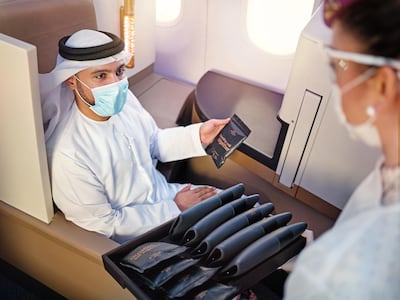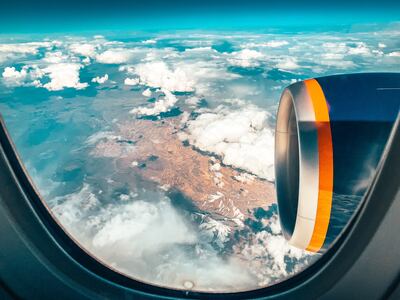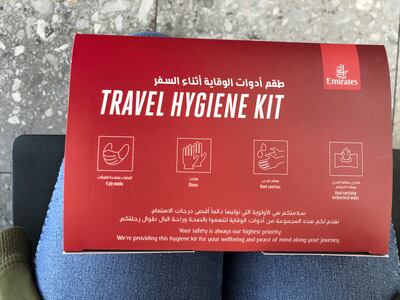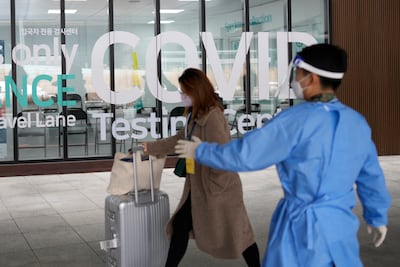The World Health Organisation has advised countries to reconsider recommending passengers wear face masks on long-haul flights.
It comes after WHO officials deemed Covid-19's newest sub-variant nicknamed Kraken “the most transmissible”.
However, travellers with coming flights planned should not panic.
Most airlines are fitted with high-tech, medical-grade filters that provide clean air. “Hepa filters have the same hygiene standards as a surgical room, a place that's considered very sterile,” explains Dr Nadia Bastaki, who led Etihad Airways' medical facility and response during the pandemic.
Additionally, wearing a face mask makes more sense than not wearing one.
Dr Sweta Adatia, medical director and specialist neurologist at RAK Hospital, tells The National she agrees especially when it comes to long-haul flights.
“Although the flights are negative pressurised and the circulation is very well monitored, it is always advisable to wear masks because of the proximity to other people and the duration of contact," Dr Adatia says. "Face masks are a very easy shield against Covid-19 when it comes to protection.”
Passengers worrying about travel can take some simple steps to help stay safe in the air.
Most effective face masks to wear on flights

During the height of the pandemic, wearing a face mask was mandatory on most airlines, including the UAE's two largest carriers Emirates and Etihad. Since restrictions have eased, so have airline policies with most carriers making mask-wearing optional.
To select destinations such as Thailand, the Philippines and China, masks remain mandatory.
“Viruses have the habit of changing their structure, their genetic make-up, which is why the mutations don't stop and that is the reason why we should not take Covid-19 lightly. It is always advisable to wear masks in a crowd,” said Dr Adatia.
“This particularly applies to pregnant women, immunocompromised individuals, people who are on multiple medications, those who have had severe Covid in the past or who could not take the vaccines — they should always wear a mask.”
Passengers planning on wearing face coverings should opt for N95 respirator masks. These have proven to be the most effective at slowing the spread of the virus, according to data from the Centres for Disease Control and Prevention in the US.
These protective face coverings fit snugly and can reduce a person’s exposure to small airborne particles.
Three-layered surgical masks can also provide some protection when worn properly. The outermost layer is moisture-proof and can shield against droplets, but travellers need to ensure these masks fit tightly.
Home-made and fabric face masks are less effective in protecting against Covid-19, according to the CDC.
“If wearing a cloth mask, ensure the mask is washed and clean, the inner layer is made of absorbent material like cotton, the middle layer is made of non-absorbent material like propylene and the outer layer is made of non-absorbent material like polyester and polyester blends,” says Dr Sarah Rashed, a general practitioner at RAK Hospital.
Booking the safest seat on a plane

Not all seats on an aircraft are created equal. Several studies have shown that window seats are the safest places to sit on flights when it comes to chances of infection.
That’s because they offer first access to refreshed air. Most aircraft that are fitted with Hepa filters have an airflow that travels up the sides of the cabin, down towards the aisle and then back into the filter. This means that travellers sitting at the window typically receive the refreshed air before other passengers.
“Everyone is not sharing the same air, it's zone-related. Only every three or four rows of seats would share a circulation. The air moves around this zone in a circular motion, it goes up through the filters and then out, it's constantly being recirculated,” says Dr Bastaki.
Passengers in window seats also have less chance of coming into contact with potentially infected passengers who go up and down the aisle during flights. Even cabin crew are kept at arm’s length from travellers sitting by a window seat.
Top travel tips for staying safe when flying

Other recommended practices for safe travel include not moving around too much on flights to limit exposure to other passengers. Frequent hand washing and the use of hand sanitiser are good ways to help kill germs and prevent the spread of infection.
For travellers being extra careful or those with underlying health conditions, using disinfecting wipes to clean down surfaces is a good plan. Most viruses can’t live very long on hard surfaces, but there’s no harm in taking this extra step. Wipe down the tray table, arm and headrests, belt buckle and TV or audio controls — anything a person might touch.
During the pandemic, several airlines offered travellers hygiene kits containing masks, wipes and sanitiser. This is no longer the case for most airlines, but travellers can pack their own.
Taking a Covid-19 test before flying

The majority of destinations around the world no longer require to take a Covid-19 test before boarding flights or on arrival.
Responsible tourists with symptoms of Covid-19, or those who have come into close contact with someone confirmed to have the virus, should still take a test before getting on a plane, especially in regions where they remain affordable and widely available.
Travellers who know their Covid status can help decide whether or not it's safe to travel, reduce chances of getting sick while overseas and prevent other passengers from catching and spreading the virus in transit.






















